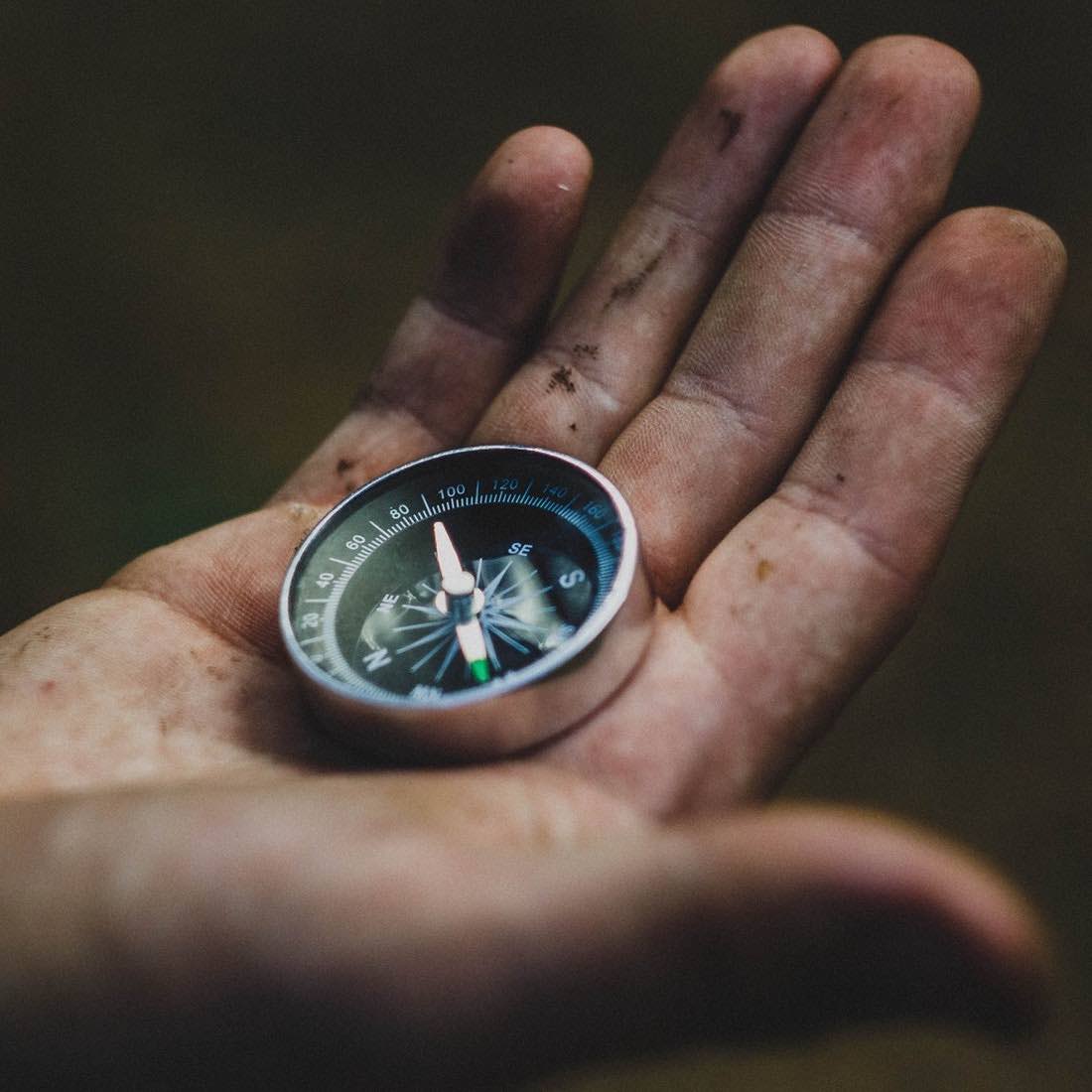Have you ever been lost, and I mean really lost? The sort of lost where a dawning realisation of your circumstances, coupled with a rising panic, starts to overwhelm you? What did you do? How did you do an analysis of the situation?
I was once on an expedition in the jungles of Central America doing some mapping of archaeological sites and stepped a few metres away from the main group. Very quickly I realised I could not see or hear anyone and I had lost the trail. I really had to work at getting calm. I stopped and thought before moving. Then I clearly marked where I was (to stop me getting even more lost) and started an outward circular search until I found something or someone I recognised.
JRR Tolkein wrote “not all who wander are lost”, but equally, there are many people wandering through life with no real idea of where they are of where they are going. Sure, you may know geographically that you are in a certain place, but are you truly in the right place? Are you where you meant to be, where you need to be?
Are you exactly where you need to be according to your greater life purpose? If not, then like I did in the jungle, it is worth stopping and thinking before moving on again.
The Importance of Situational Analysis
The ‘Where’ questions (particularly in The Right Questions approach) relate to the present location and the destination; the starting point and the vision. The first of these we need to consider is our starting point. In other words we need to do some situation analysis. This is because, when you set off on any journey, you need to know where you are first. If you look at a map or want directions, the initial thing to identify and confirm is your present location.
I learnt this lesson as an officer in the military and as a mountain leader. Constantly we were asked during training to get out our maps and indicate to the instructor exactly where we were. You can’t expect to lead others unless you know where you are and where you are going.
The same applies for any new project or venture in any walk of life. Your route or your plan can only properly be defined once you know your start point. This is not just a geographical appreciation, it is an understanding of how you relate to your present circumstances. Therefore going through a thorough appreciation of where you are is essential before moving forward.
“Every new beginning comes from some other beginning’s end.”
Seneca
Free Personal Leadership Action Plan
Just sign up here to receive your free copy
The importance of perspective
Keeping the right perspective is not always easy. Jim Collins, in his excellent book Good to Great, talks about the ‘Stockdale paradox’, the idea of confronting the ‘brutal facts’ of the situation while maintaining the belief that you will prevail. Admiral James Stockdale survived as a prisoner of war in Vietnam for over seven years under the most horrific conditions. Stockdale concluded this about the mentality that helped him survive:
“This is a very important lesson. You must never confuse faith that you will prevail in the end — which you can never afford to lose — with the discipline to confront the most brutal facts of your current reality, whatever they might be.”
Admiral James Stockdale
Stockdale did not try to fool himself over his present situation and neither should we, especially as what we face is unlikely to be anywhere near as bad as the years of torture he had to confront! We need to maintain our hope for the future, tempered with a healthy realism about how we deal with the present.
When one looks at the hard data it can be daunting at first but as you take things to their natural conclusion it can also be releasing. If we ask ourselves ‘so what?’ of every challenge we face, and think through what could happen, and – more importantly – what you would do if the worst was to happen, then we can confront our fears and dismantle wrong assumptions and defeater beliefs.
Be honest with yourself
Once you realise the importance of facing the brutal facts it is time to be honest with yourself. Self reflection can be painful but unless you can be honest with yourself you will struggle to be honest with anyone else.
“Truth – more precisely, an accurate understanding of reality – is the essential foundation for producing good outcomes.”
Ray Dalio
Identifying and analysing where you are
When doing some self reflection and situational awareness it is worth getting multiple inputs and viewpoints.
This is similar to when trying to navigate in the wilderness. You need to use all your senses and tools at your disposal to help you. You would use your eyes, ears, your smell to give clues. You would look not only at your map, but also take bearings to known landmarks. You might also use a GPS or altimeter.
The point being that the more data you have, the more likely you are to have an accurate and rounded awareness and therefore be able to make an effective situational analysis.
There are various exercises to get you going, as an individual, in working out the reality of your present situation. Here are few things you can try:
Phone a friend
In terms of your personal life why not ask someone close to you – a good friend, partner or mentor – how they think you are doing. If you are like me, and don’t like criticism this can be really hard, but if these are people that respect or love you then what they are telling you is for your own good.
So, get them to be really honest with you!
Ask them:
- What do they see as your strengths and weaknesses?
- What do they think of what you are doing now and your present direction?
- What hopes and concerns do they have for you?
Check your diary and finances
Have a look at your calendar and personal finances for the last few months.
I use my online calendar constantly. It is synced between my various devices and I update it regularly, including specific time each week and then every day to update my tasks and priorities. Then, at the end of the day I go back and update the day with what actually happened. This is helpful in terms of reflection, re-organising tasks that have not been achieved, and creating a record for when I look back in the months to come.
You can do a similar exercise looking at your finances, your bank and credit card statements. It is particularly useful if you have set some sort of budget previously as then you can review your actual spend against what you planned.
When you looking at your diary and finances identify the trends:
- What are you spending most money and time on?
- Where are you failing to achieve your aspirations in terms of time and finance?
How you spend your time and money will give you an idea of your priorities and therefore get an insight into your values. It gives facts on the external commitments and pressures you are facing too.
Do some self reflection
Review your journal or note books. If you don’t have a journal, start one, or find some way to record and reflect on what you do.
I end up keeping a record in various places. I always have a paper notebook with me which I make notes in but also use it for sketching and thinking through ideas spatially. I use the note function on my phone and computer to keep lists, the most important of which is my to-do list. I already mentioned how I use my online calendar to record as well as plan. As well as all this I write posts and articles such as this one. Some are practical, some are more introspective, but the discipline of writing helps to reinforce learning and provide reflection.
So how about you?
- What methods can you best use to record and reflect upon life?
- What themes can you identify in your thoughts and actions?
Leadership Development: Master the Top Leadership and Life Skills
Better lead in life and work to maximise your success. Sign up and access materials for free!
Write your bio
One good idea is to write a short biography. Try and keep it to one page but try to encapsulate your story to date; how you arrived where you are today and what have been the key milestones. Limiting the length of the bio forces you to edit and prioritise the most important events.
You may already have bios on social media, websites or elsewhere. These can provide a good starting place but go beyond just your work history – or the things you want other people to see!
- What are the events that shaped you?
- Who were the people that really helped you to where you are now?
Update your CV
In a similar vein to the bio, it is also a great exercise to update or write a new CV. This process helps you to summarise your achievements in a structured way. Similarly to writing your bio, think of the most significant events in your history and the part you had to play in them.
One specific approach you can use is the ‘Made Of’ model. Chose a timeline or event and analyse:
- the people involved
- your goals
- the successes
- the obstacles you overcame
- what you learned
There are lots of resources online to help you and if you don’t know where to start then click here:
How to write a successful CV
Review reports and appraisals
Regarding your work life you can look at past appraisals, reports and testimonials you might have. All of these things start to build up a picture. This is similar to the ‘phone a friend’ exercise in that it provides an external view of you at a point in time.
I keep all my old appraisals and reports – from my school days up to the present – in a folder. It is fascinating to look back on the common themes that various people, at various times, have picked up on. Themes such as leadership, communication, people development and adventure keep coming up and still resonate with me today. But there are also plenty of ways that I have changed, and there are also a few reports that record and illustrate my failures and shortcomings. These are good to keep me honest!
if you are interested you can read more about my failings in the post My Many Leadership Failures.
Try a personality or psychometric test
I am not a big believer in the being able to put our personalities into neat boxes. I believe we are all unique in our own way and the many facets of our personality, our preferences and gifts are too complex to easily sum up. That being said, psychometric tests can help us learn more about ourselves and give us greater understanding of those we live and work with.
“All models are wrong but some are useful.”
George Edward Pelham
There are plenty of paid and free personality and psychometric tests available, most of which you can find online. Here are a few popular ones that I have tried out and found insightful:
- Myers-Briggs (based on the psychological research of C.G. Jung)
- The Big 5 – You can sign up for a free account at Finding Potential and do this and similar tests. I have used their service for myself and teams I have managed and have found their reports very useful (and no, I am not getting paid to recommend them or if you follow the link!)
- StrengthsFinder 2.0 (developed by Gallup)
- Belbin (more for use in a team context but really useful)
My big advice when using these tests is to remember that they are just tools. Don’t get too worried by the reports they generate. Sometimes I don’t like the results I see in these tests as I don’t think they fit for me personally. But that can be helpful; that feeling or thought is an indication of something that needs further analysis. So if you see an outcome that surprises you, question it:
- Is that answer or output really true of who you are?
- Is the test giving a more honest appraisal of you than you are willing to admit, or is it wrong?
The SWOT Analysis
Another simple assessment tool that many people know about is the SWOT analysis. Many people have used it but few do a SWOT analysis for themselves. I really recommend it – it is one of the simplest and more informative ways you can do a quick situational analysis. You can also do it for your team or your whole organisation. ‘SWOT’ stands for:
- S: What are the biggest strengths of you, your team or your situation?
- W: What are your inherent weaknesses?
- O: What are the opportunities of your situation?
- T: What are the external threats that you are facing?
The great thing about the SWOT analysis is takes a balanced view of your present situation. This is very important because we face a couple of dangers at this stage. Firstly we can paint too rosy a picture of our situation if we choose to overlook or gloss-over certain facts. The second danger is that by looking at all the challenges the situation can seem overwhelming and this can lead to paralysis rather than action – just the opposite of what we are trying to achieve. So we need to have the right perspective.
You can read more about the SWOT analysis in this post on How to do a SWOT analysis.
The challenges of life
Compared to a prison camp we might think our problems are small, but life is full of its own challenges that can seem big enough. Unless we identify and deal with these issues they will hold us back. You cannot be happy or successful by ignoring things. As Philip Wylie said, “Ignorance is not bliss, it is oblivion.”
What are you facing at the moment? Financial insecurity? Challenges at work? Difficulties in your relationships? A lack of confidence or motivation? Whatever it is, the first step to overcoming the challenge is to identify it. Do some situation analysis. Call it out; don’t ignore it, deny it or hide it. Confront it.
This can be easier said than done, I know.
In my experience, as well as taking time to think about an issue it can also be worth writing it down or speaking to someone about it. Externalising can help (and I say that as an introvert). This is where a good friend, coach or mentor can be invaluable.
I have appreciated times when people have really listened to me when I have been working through problems and professionally I have spent a lot of time, as a coach, creating an environment where people can talk about and think through challenges. And in my experience, it really works.
Reflection Question:
Have you ever resolved a bad situation by facing up to it and seeing it in a new light? What was the outcome?




